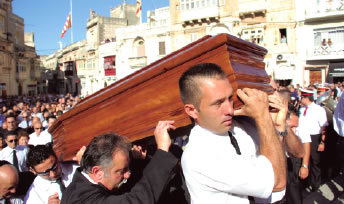Justice and Home Affairs Minister Tonio Borg said that he will be awaiting the report of the pyrotechnics commission set up by the government four months ago before deciding whether to change the present policy of licensing fireworks factories without an insurance policy on the premises.
 |
The funeral for the five men who died in the tragic St Helen’s factory explosion in Birkirkara, last Saturday |
“The commission will be presenting its report in the coming months and this could well be one of its proposals. A balance between the interests of safety and tradition must be struck. One must remember that there are 37 licensed factories in Malta and Gozo,” he said.
Borg explained that although fireworks factories are not covered by an insurance policy, each letting-off of fireworks is covered by a separate insurance policy.
The pyrotechnics commission, which was set up by the Justice and Home Affairs Ministry in order to propose changes to the current legislation on fireworks, is composed of Carmel Magro representing the Ministry as Chairperson and Deputy Police Commissioner Andrew Seychell, Joseph Theuma as an expert in pyrotechnics, Anthony Farrugia representing the Pyrotechnics Federation and Annetto Portelli. The executive secretary is Civil Protection Director Peter Cordina.
On his part, Labour’s spokesperson on Home Affairs Gavin Gulia told MaltaToday that “in view of the latest tragedies the MLP will be continually assessing internally the prevailing legal situation with a view to minimising risks. The matter requires a holistic strategy and not a piecemeal approach in specific areas of concern.”
He did not commit himself on whether a new Labour government would change the current licensing policy on fireworks factories which does not require an insurance policy for these premises.
The lack of insurance cover for fireworks factories came to the fore after the explosion at the St Helen Fireworks factory at Ta’ Xwieki three weeks ago which left neighbours with substantial damages to their properties.
On Monday, they filed a judicial protest against the Government and the Police Commissioner holding them responsible for the material damages they sustained in the explosion on 27 June which left five people dead as well as for any future damages.
They also called on the authorities to withdraw the licences of the St Helen Fireworks Factory as well as the nearby Briffa Factory.
This after it emerged that in 2001, the Cabinet had regularised the position of the two factories despite the fact that they lie closer than the 183-metre limit set out by the Explosives Ordinance.
Sarah Attard Gialanze
Bianca Caruana
It seems insurance cover for firework factories is not readily available, if at all, according to most established firms contacted by MaltaToday yesterday.
At most, it is the actual use and display of fireworks which can qualify for insurance, and this would only be limited to damages to third parties. Firms contacted yesterday stated that safety regulations over explosives and fireworks do not appear to be strongly enforced, and that it was too probable that loss would occur on their part.
One brokers’ company said insurance firms do not seem ready to take up such a risky prospect. “With the amount of incidents occurring, it tends to raise questions as to why it keeps happening,” one company spokesperson said.
Another insurance broker said insurance could be possible from foreign companies, “but it would come at a price.”
A governmental attempt at drawing up a collective insurance policy a decade ago for all factories was never taken up by insurance companies, said Annettu Portelli, whose own factory remains uninsured to this day. “Most fireworks factories are not furnished with enough funds to insure themselves, so when a factory operates for commercial use, it makes a profit and is able to set aside some capital for insurance, whereas the factories which are not commercial do not have the means.”
Portelli also said that factories situated near residences would have to fork out even more money to insure their premises, since any buildings in the vicinity must be accounted for in case of accident.
Toni Busuttil, a commercial manufacturer, also operates an uninsured factory. Instead, it is the actual display of fireworks that is insured, something he says is up to the client to choose which company will provide the insurance cover for the propelling of the fireworks from the ground.
In such cases, Busuttil’s company itself will have to fork out the first Lm1,000 to the insurance company for the display of the fireworks.

